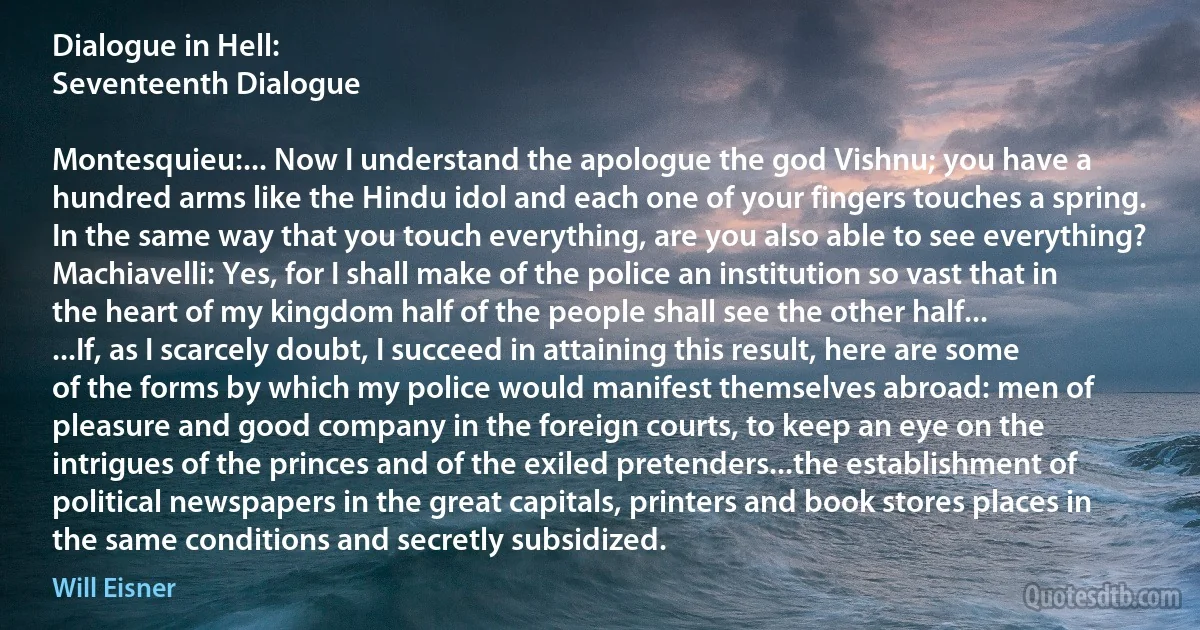
Dialogue in Hell: Seventeenth Dialogue Montesquieu:... Now I understand the apologue the god Vishnu; you have a hundred arms like the Hindu idol and each one of your fingers touches a spring. In the same way that you touch everything, are you also able to see everything? Machiavelli: Yes, for I shall make of the police an institution so vast that in the heart of my kingdom half of the people shall see the other half... ...If, as I scarcely doubt, I succeed in attaining this result, here are some of the forms by which my police would manifest themselves abroad: men of pleasure and good company in the foreign courts, to keep an eye on the intrigues of the princes and of the exiled pretenders...the establishment of political newspapers in the great capitals, printers and book stores places in the same conditions and secretly subsidized.
Will EisnerRelated topics
able abroad arms book company doubt establishment everything eye foreign good great half heart hell hindu hundred institution men kingdom now people pleasure result see seventeenth spring touch vast vishnu way yes montesquieu machiavelliRelated quotes
I gave up on this stuff. I gave up on my species and ... I gave up on my countrymen. Because I think we squandered great gifts. I think humans were given great great gifts: walking upright, binocular vision, opposable thumb, large brain ... We grew. We had great gifts, and we gave it all up for both money and God ... We gave it all up to superstition, primitive superstition, primitive shit ... Invisible man in the sky, looking down, keeping track of what we do, make sure we don't do the wrong thing, if we do, he puts us in hell, where we burn forever. That kind of shit is very limiting for this brain we have. So we keep ourselves limited. And then we want a toy and a gizmo and gold and we want shiny things, and we want something to plug in that will make big big big things for us... And all that shit is nothing! It's nothing.

George Carlin
Let us imagine that the aboriginal-original human specimen was one of two brother apes, A and B; they were alike in every respect; both were animal space-binders; but something strange happened to B; he became the first time-binder, a human. ... He had thus a new faculty, he belonged to a new dimension; but, of course, he did not realize it; and because he had this new capacity he was able to analyze his brother "A"; he observed "A is my brother; he is an animal; but he is my brother; therefore, I AM AN ANIMAL." This fatal first conclusion, reached by false analogy, by neglecting a fact, has been the chief source of human woe for half a million years and it still survives. ... He [then] said to himself, "If I am an animal there is also in me something higher, a spark of some thing supernatural."

Alfred Korzybski
For what advantage is it, that the world enjoys profound peace, if thou art at war with thyself? This then is the peace we should keep. If we have it, nothing from without will be able to harm us. And to this end the public peace contributes no little: whence it is said, ‘That we may lead a quiet and peaceable life.' But if any one is disturbed when there is quiet, he is a miserable creature. Seest thou that He speaks of this peace which I call the third (inner, ed.) kind? Therefore when he has said, ‘that we may lead a quiet and peaceable life,' he does not stop there, but adds ‘in all godliness and honesty.' But we cannot live in godliness and honesty, unless that peace be established. For when curious reasonings disturb our faith, what peace is there? or when spirits of uncleanness, what peace is there?

John Chrysostom
These riot vultures do a lot of damage to India, among other reasons because they are so eagerly believed abroad.... Since approximately the Stone Age, Engineer has been travelling to riot spots in India (butchering of minorities in Pakistan and Bangladesh somehow doesn't interest him as much) with prefabricated riot reports invariably showing the same ingredients: Hindu pre-planning, Muslim victimhood, anti-Muslim complicity of the police and some local politicians. With the "facts” of the matter fixed beforehand, the main purpose of his visits is to note down some local names in order to give his reports more credibility. ... Undeniably, Asghar Ali Engineer remains a formidable master of disinformation. This makes him an excellent representative of Indian secularism and of the anti-temple campaign in particular.

Koenraad Elst
Dialogue in Hell:
Ninth Dialogue
Machiavelli: And where have you ever seen that a constitution, really worthy of the name, really durable, has ever been the result of popular deliberation? A constitution must come forth fully armed from the head of one man alone, or it is nothing but a work condemned to oblivion. Without homogeneity, without linking of parties, without practical strength, it will necessarily bear the imprint of all the weaknesses of sight that have presided at its composition....
Montesquieu: ...One would say, to hear you, that you are going to draw a people out of chaos or out of the deep night of their first origins....
Machiavelli: I do not say no: therefore you will see that I need not destroy your institutions from top to bottom to arrive at my goal. It will suffice me to modify the arrangements and to change the methods.

Will Eisner
